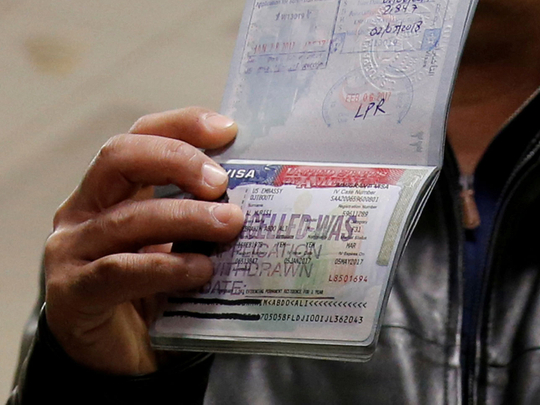
Washington: The Trump administration is making it tougher for millions of visitors to enter the US by demanding new security checks before giving visas to tourists, business travellers and relatives of US residents.
This “extreme vetting” of visa applicants at US embassies worldwide will likely cause long delays for would-be travellers as the government scrutinises everything from work history to social media, immigration lawyer and advocates said.
Diplomatic cables sent from Secretary of State Rex W. Tillerson to all US embassies instructed consular officials to broadly increase scrutiny.
The new rules generally do not apply to 38 countries — including most of Europe and long-standing allies like Australia, New Zealand, Japan and South Korea — whose citizens can be speedily admitted into the United States under the visa waiver programme.
No countries from the Middle East or Africa are part of the programme. In 2016, the United States issued more than 10 million visas to foreign visitors. Under new directives people who have ever set foot in territory controlled by Daesh must undergo a mandatory social-media review.
That could affect many visa applicants from Iraq, even though the country was removed this month from a list of majority-Muslim countries with a travel ban under a January 27 executive order signed by President Trump and later revised.
“Consular officers should not hesitate to refuse any case presenting security concerns....” Tillerson wrote, adding, “All officers should remember that all visa decisions are national security decisions.”
The Tillerson cable, first reported by Reuters, instructs consular officials to explore all available leads in investigating an applicant’s background.
“Consular officers should not hesitate to refuse any case presenting security concerns….” he wrote, adding, “All officers should remember that all visa decisions are national security decisions.”
It is unclear, however, how much time consular officials will be expected to dedicate to in-person interviews with applicants. It advises each official to schedule no more than 120 visa interviews a day, the equivalent of four minutes per interview, or about the same as before.
No specifics
Immigration advocates say that even though Tillerson just reiterated the long-standing expectation that national security is paramount when consular officers decide whether to grant visas, it is likely to lead to more denials, even among applicants with legitimate reasons to visit the US. The decisions of consular officials are considered final, and virtually never subject to appeal.
“If you’re a consular officer, given how much attention is being paid to national security, if it’s at all close, you’d rather be the officer who denies a visa knowing there’s never a chance at review than the person who issues a visa to someone who commits a terrible act,” said Legomsky. “It’s a strong incentive to deny a visa without a shred of concern for what that person might be.”
Greg Siskind, an immigration lawyer in Memphis, worries many physicians, university professors and researchers will face delays or denials because of the places they come from.
He thinks investigators could try to build databases of connections between people based on their Facebook friends and Twitter followers.
“Maybe that’s how you flag people, who are a second- or third-degree connection away from someone on the watch list,” he said. “It’s not necessarily what you’ve said on social media. It’s who you’re connected to.”












